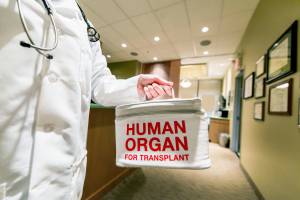The world’s first single and double lung transplants were performed in Ontario in 1983 and 1986 respectively. Canada is a leader in the field of transplantation when it comes to medicine and technology, but when it comes to the number of organ donors, we’re lagging behind the rest of the world, including the United States.
In the last 10 years, the number of deceased organ donors has increased in Canada, but the number of people needing transplants has also increased. In 2014, there were more than 4,500 people waiting for organ transplants. Doctors performed 2,356 organ transplants, and 278 people died waiting for an organ. Kidney transplants account for 77 percent of the need.
Surprisingly, 90 percent of Canadian citizens support organ and tissue donation. It’s something practically everyone agrees on, but according to the Canadian Transplant Society, only about 20 percent of the population has actually made plans to donate.
Qualifications for Organ Donors
Don’t discount your health, age or other factors when determining whether you should be a donor. Your health today doesn’t determine whether your organs qualify to be donated. There are many different organs that can be donated. Your organ donation could save up to eight lives. Tissue donations could improve the quality of life in up to 75 different people. Also consider the improvement in life quality for the families and friends of those individuals who are helped.
There are many myths about organ donations. Some people worry that the hospital staff won’t work as hard to save your life if they know you’re an organ donor. This is simply a myth perpetuated by the tabloids, urban legends and television. Doctors have to focus on your life, not the life of another person.
Another myth that is perpetuated by the tabloids is that you may not really be dead. Doctors perform even more tests on organ donors to determine that they are really dead than they might on someone who hasn’t agreed to organ donation.
If you’re concerned about your religion’s position on organ donation, check with your clergy. Most major religions support organ donation, but you should discuss your theological concerns with someone who is knowledgeable about the tenets of your faith.
Legally, children cannot decide to be an organ donor, but children do die every day, and other children are waiting for organs from smaller people. Parents and legal guardians can give permission for children to be organ donors. There’s no denying that it is a difficult decision. Thinking about your position on organ donation before something happens is one way to have peace about it if it ever happens that you do need to make the choice.
How to Register
Registering to be an organ donor is the most effective method of identification. You may lose a wallet card, or it might be unavailable when it is needed. Telling one family member is recommended, but again, in the stress of the moment, your decision may be forgotten. Registration is quick and easy.
It actually takes very little time to register as an organ donor. In Ontario, the website is beadonor.ca. You’ll need your health card number and some basic information about yourself. If you’re in another province or territory, the Government of Canada’s website, under health, diseases and conditions, has links to instructions for your place of residence.
Loved ones are asked about your wishes at your death, which is why it’s important to talk to them about your decision. The Canadian Transplant Society has some resources to help you talk to your family, and it offers an End of Life Wishes form for download. Make a difference in people’s lives after your death by choosing to be an organ donor. Get informed.



